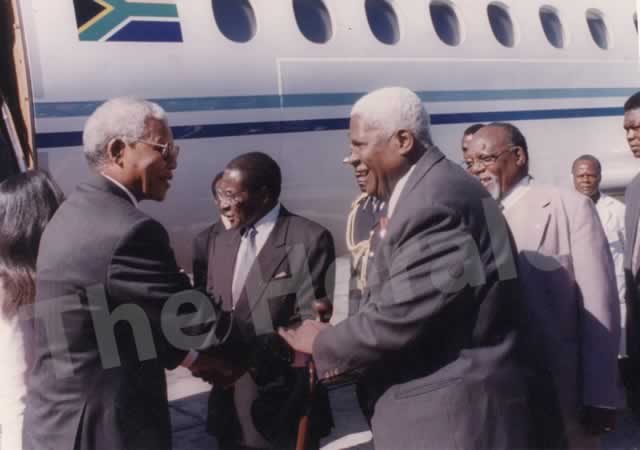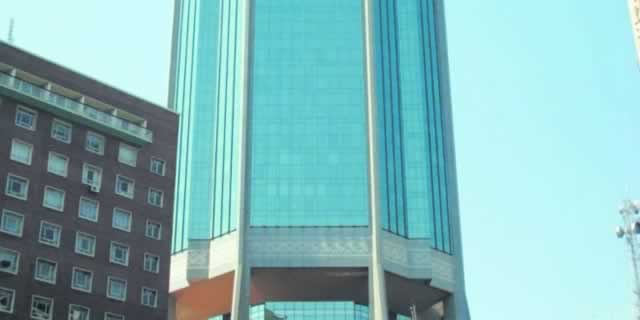Mandela champion of the oppressed: President


President Mugabe welcoming the late Cde Nelson Mandela on arrival at the Harare International Airport in May 1997.
Farai Kuvirimirwa Herald Reporter
Mr Nelson Mandela was a champion of the oppressed and his commitment to liberation will forever be cherished by Zimbabwe, President Mugabe has said.
In his condolence message following the death of South Africa’s first black President on Thursday, Zimbabwe’s Head of State and Government described Mandela as a fighter for justice.

President Mugabe gives a toast to a closer relationship between Zimbabweans and progressive South Africans and to peace and prosperity in 1990.
Mandela died aged 95 at his Johannesburg home after a protracted lung infection and will be buried on December 15.
President Mugabe yesterday wrote to South Africa’s President Jacob Zuma saying, “On behalf of the Government and people of the Republic of Zimbabwe, Zanu-PF and indeed on my own behalf, I would like to extend deep condolences to you and, through you to the Government and people of the Republic of South Africa, on the death of the great icon of African liberation, freedom fighter and the first President of a free, independent and democratic South Africa, Mr Nelson Rolihlahla Mandela on 5th December 2013.
“Mr Nelson Mandela’s renowned and illustrious political life will forever remain a beacon of excellence. Not only was he a great champion of the emancipation of the oppressed, but he also was a humble and compassionate leader who showed selfless dedication to the service of his people.

The late cde Nelson Mandela greets the late Vice President Joshua Nkomo at the Harare International Airport soon after his arrival in 1997. In the background are President Mugabe and the late Vice President Cde Simon Muzenda.
“We join the rest of the nation in mourning his departure. The late Nelson Mandela will forever remain in our minds as an unflinching fighter for justice.”
Through President Zuma, the Commander-in-Chief of the Zimbabwe Defence Forces extended his condolences to Mandela’s widow, children and wider family.
“Please accept, Your Excellency, the assurances of my highest consideration,” he added.
Born on July 18, 1918 in Umtata in Transkei, Mandela rose from rural obscurity to challenge oppression by the apartheid Government and was among the first to advocate armed resistance to apartheid in 1960.
This was after he had been instrumental in the formation of the ANC Youth League.
Mandela was detained for 27 years at the Robben Island prison and was elected President in landmark all-race elections in 1994 before retiring in 1999.
He was awarded the Nobel Peace Prize in 1993, an honour he shared with Frederik W de Klerk, the last white Afrikaaner leader of South Africa.
As President, Mandela faced the monumental task of forging a new nation from the deep racial injustices left over from the apartheid era, making reconciliation the theme of his time in office.
He was to be succeeded as President by Thabo Mbeki and made his last major public appearance in 2010 at the FIFA Soccer World Cup — the first time the showpiece was staged on African soil.
Zimbabwe and South Africa’s ties run long and deep, with liberation movements from the two countries collaborating to fight
the oppressive Western-backed regimes in their two countries. Those racist regimes largely worked hand-in-glove to ensure indigenous peoples remained second class citizens.
Zimbabwe, after gaining independence in 1980, hosted South African liberation fighters and nationalists and provided support for their struggle against aparthied.
So close were the two countries that, as revealed by Former President Mbeki, Zimbabwe delayed its land reform revolution so as to give liberation fighters in South Africa time to first deal with aparthied before confronting colonially privileged white farmers back home.
It was felt at the time that should Zimbabwe initiate widespread land reforms, the ensuing backlash from white farmers and governments in Europe and North America would work against efforts to end white supremacist rule in South Africa.
Bilateral relations between South Africa and Zimbabwe improved substantially as apartheid officially ended.
President Mugabe formally met Mr Mandela for the first time on January 27, 1994 along with Botswana’s then President Ketumile Masire to find a peaceful resolution to a military mutiny in Lesotho.
Mr Mandela visited Harare in early 1995 and the two countries discussed trade issues and means of dismantling apartheid-era tariffs.
In November 1995, a ceremony attended by President Mugabe and Mr Mandela marked the opening of a new bridge linking the two countries, across the Limpopo River.
Since then, trade between the two has boomed, as have cultural exchanges. In the past decade, the trade – both formal and informal – has seen Zimbabwe’s cash economy pumping millions of US dollars into South Africa, and in the country in return accessing goods and services.
Mr Mandela’s successor, Former President Thabo Mbeki, played a pivotal role in resolution of the political stand-off between Zimbabwe’s main political parties.
The fruit of Mr Mbeki’s efforts, the inclusive Government, paved the way for a key election on July 31, 2013 that saw President Mugabe romping to victory in a poll that South Africa joined many other observers in endorsing.









Comments